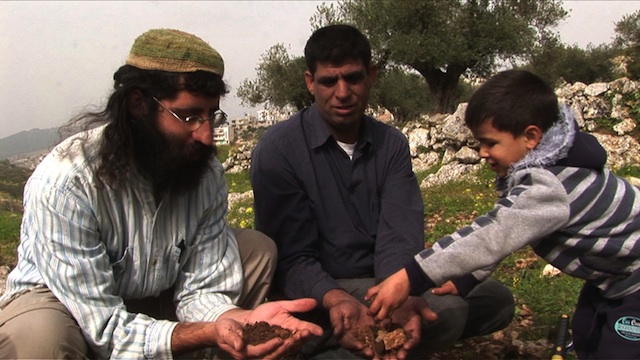 A joint farming project is harnessing what many Palestinians and Jewish settlers have in common– love of the land and the desire for peace– to foster co-existence.
A joint farming project is harnessing what many Palestinians and Jewish settlers have in common– love of the land and the desire for peace– to foster co-existence.
By Rachel Kohn
The plot of land chosen for Heaven’s Field Organic Farm, or Allah’s Farm in Arabic, is strategically located between the Arab village of Husan and Jewish suburb of Beitar Illit, less than an hour’s drive southwest of Jerusalem in the West Bank. The field is an acre in size, a modest space for Jews and Arabs to interact as individuals while working the land so dear to so many.
Heaven’s Field started as a vision shared between a Palestinian farmer, an Israeli teacher, and the Israeli co-founder and director of Eretz Shalom, an organization that facilitates dialogue and peace-building activities between Arabs and Jews in the West Bank. They believe that just as personal convictions and a fierce sense of connection to this land can pit people against each other, so too can these forces unite people and help peace take root.
The founders of Heaven’s Field certainly speak from experience. When Farm Manager Ziad Sabatin, 41, was ten-years-old, he watched helplessly as Israeli soldiers uprooted his family’s sprawling groves of olive, apricot, and almond trees. “We raised those trees like you would raise a little boy, pampering him and raising him and giving him everything he needs,” says Ziad. His father and brothers demanded an explanation and were told that the land was now part of a military zone.
“When you see something like that, suddenly all of your hopes destroyed”… It is a strong strike to the heart,” he says.
In 1987, Ziad began the first of two stints in Israeli prison; like many teenagers, he had channeled his pent up frustrations into the first intifada, a popular Palestinian uprising targeting Israeli military and civilians. It was during his time in jail that Ziad and other Palestinian inmates decided that violence did not serve their interests. Upon their release, they teamed up with former Israeli soldiers and founded Combatants for Peace, an organization committed to challenging the cycle of violence through dialogue and grassroots activism.  Eventually, Ziad broached the subject of the Palestinians’ Jewish neighbors in the West Bank, the mitnachalim; settlers characterized by their faith-based commitment to maintain Jewish communities in the historical boundaries of the Land of Israel. There are settlers who support our mission, he told his companions, but the idea of including such people did not go over well. Ziad received an ultimatum: if he wanted to work with settlers, he had to leave Combatants for Peace.
Eventually, Ziad broached the subject of the Palestinians’ Jewish neighbors in the West Bank, the mitnachalim; settlers characterized by their faith-based commitment to maintain Jewish communities in the historical boundaries of the Land of Israel. There are settlers who support our mission, he told his companions, but the idea of including such people did not go over well. Ziad received an ultimatum: if he wanted to work with settlers, he had to leave Combatants for Peace.
Ziad left, undeterred, and about six years ago he found a kindred spirit in Rabbi Menachem Froman. Chief Rabbi of the West Bank town of Tekoa, Rabbi Froman advocated using religious values and love of the land and as a common ground to open dialogue between Israelis and Palestinians. He supported Jewish and Arab co-existence in the West Bank– even as part of a Palestinian state, if it meant peace. By the time of his death in March 2013, his philosophy had attracted Palestinians like Ziad, and settlers like Nachum Pachenik, head of Eretz Shalom, and Shaul Yudelman, a Jewish immigrant from Seattle living in the West Bank for 13 years.
“I grew up in a multi-cultural western city– full of humanistic, universal[ist] messages,” says Shaul, 35. “As much as those fantasies have been challenged by living here through the second intifada, the Lebanon war, the rockets in the south, being shot at and more– I think Rabbi Menachem was able to elicit for me a new way of believing in the process of peace work.”
“If there is a way for the killing and hatred to stop– how could we not try to do what we can?”
Now the environmental director of Heaven’s Field, Shaul originally came to Israel to find Jews who were connected to both Jewish tradition and the land of their forefathers. “You find young people who are very connected to living on the land,” he says, “taking joy out of working the land, harvesting, building in a more natural way– not everyone, but some– and a vision of a Jewish life reconnected to the gift of this land that searches for learning not just in the books but a return to something more oral and alive.”



